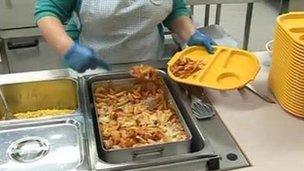Welfare: Free school meals at risk - Welsh government minister
- Published

Children are entitled to free school meals if their parents can get various benefits
Welfare change could put access to schemes like free school meals at risk, a Welsh government minister has warned.
Anti-poverty minister Huw Lewis said Whitehall was not releasing key information about who will be eligible for benefits under universal credit.
He called it "a potential car crash" but hoped his fear would be misplaced.
The Department for Work and Pensions (DWP) said it had worked closely with Welsh ministers on the issue for over a year and appreciated its importance.
The new system will merge benefits and tax credits into a monthly payout.
Universal credit is beginning with a very small number of new claimants in Ashton-under-Lyne in Greater Manchester, but is to affect about eight million people by 2017.
Mr Lewis told a cross-party committee of AMs that his officials had been promised key information last May about how universal credit would relate to benefits provided in Wales - so-called "passported benefits".
These include eligibility for free school meals, food vouchers for pregnant women, school uniform grants, reduced charges for eye and dental care, home energy efficiency schemes, Blue Badges for disabled people and student support.
Access to these in Wales is currently determined by the receipt of certain UK-wide benefits, but the introduction of universal credit means major changes to the way these are calculated.
Mr Lewis, who is responsible for co-ordinating the Welsh government's approach to benefit reform, said "acute operational problems" were emerging due to the lack of information from Whitehall.
He said: "We desperately need to have the income threshold data that would enable us to establish a fair system.
'Danger of collapse'
"If we remain in a situation, come turn of the financial year next year, that universal credit is simply a 'black box' into which we cannot delve to find out whether someone is, for instance, eligible for free school meals, then the passported benefits system will be in danger of collapse.
"I have to tell you that I am extraordinarily nervous - time is running out," Mr Lewis added.
A DWP spokesperson said: "We appreciate the importance to families of passported benefits, such as free school meals and free prescriptions.
"That is why we have worked closely with the Welsh government for more than a year to discuss how they will be implemented during the phased roll-out of universal credit.
"The final decision around eligibility and administration of passported benefits in Wales is the responsibility of the Welsh government."
Members of the assembly enterprise committee expressed concern about the Welsh government's response to the welfare changes being implemented by Westminster.
Pontypridd Labour AM Mick Antoniw said: "My concern is that it doesn't appear that there is a clearly thought-out strategy here.
"I understand there are things that are unclear and uncertain in terms of the impact - but let's take one area we do know - the £22m the [Welsh] government had to put in in respect of council tax benefit.
"We know that was effectively a one-off last year, and we know that was to mitigate the immediate impact of that benefit change being imposed on the Welsh government in a very short space of time - what, for example, is the strategy for next year?
'Desperate impression'
"Is it the [Welsh] government's intention to try and do that again or alternatively what is the fallback strategy for preparing people that there is going to be a change?
Mr Lewis replied: "We cannot say, and to impose some sort of grand strategy upon this situation would be, to my mind, to presuppose a knowledge which we do not have."
The Conservative AM Byron Davies asked why the Welsh government had not managed to extract the information needed from the Department for Work and Pensions despite weekly meetings between officials from both administrations.
Mr Davies said Mr Lewis was "conveying a desperate impression" and queried whether the issue was at political or civil service levels.
Mr Lewis said said there were "of course" political problems but that the problem was now becoming acute and it would "not be honourable" of him to come to the committee and downplay his concerns.
"I hope to goodness my concerns are misplaced and everything will come out in the wash," Mr Lewis added.
- Published1 April 2013
- Published1 April 2013
- Published31 March 2013
- Published29 March 2013